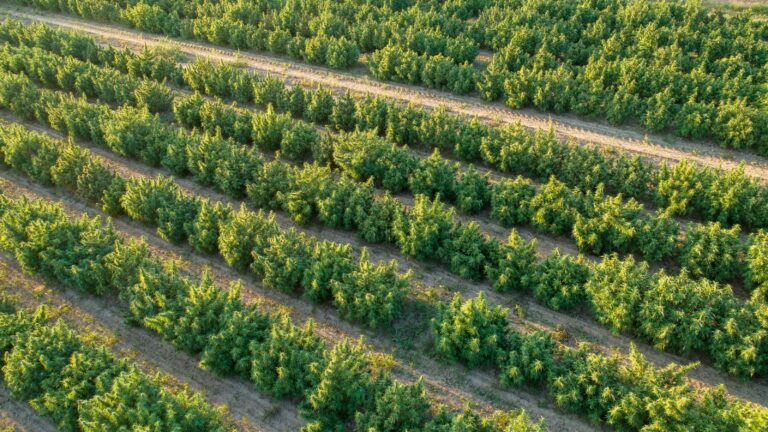The future of the sale of some cannabis products in Tennessee remains uncertain after the Tennessee Department of Agriculture issued new regulations surrounding the sale of cannabis plants, including popular THCA-based products.
On September 27, the Department of Agriculture introduced new permanent regulations for hemp and hemp-derived cannabinoid (HDC) products, as well as hemp producers and retailers.
The changes include regulations surrounding the retail sale of THCA (tetrahydrocannabinolic acid products), the most popular product sold in the state, The State of Tennessee previously reported.
Previously, the only requirement placed on hemp-derived products was that they contain less than 0.3% delta-9 THC. Currently, products must contain less than 0.3% THCA after decarboxylation, or combustion.
THCA is known to produce a marijuana “high” similar to traditional delta-9 THC when burned or used in certain edible products such as gummies.
Tennessee THCA sales tax revenue exceeds $12.5 million
The new permanent rules leave some cannabis advocates in the state concerned. Kelly Hess, CEO of the Tennessee Growers Federation, said the rule would have a negative impact on the current cannabis market and consumers.
“Tennessee's cannabis industry will be wiped out and customers will be sold out of state and on the black market,” Hess said in an email. “The 6% cannabis tax enacted in July 2023 has generated more than $12.5 million, so the demand is there and will impact many Tennessee voters.”
State Department of Agriculture officials said in a statement that the new rules were “designed to operate a regulatory program for cannabis and hemp-derived cannabinoid products.”
Agriculture officials added that they have changed the rules to comply with state law.
“The Department's authority for these regulations, the permissible limits for THC, and the required testing methods for hemp and hemp-derived products are established by Congress in state law,” the agency said. “The permanent rule does not change the laws and regulations regulating hemp and hemp-derived cannabinoid products, including THCA.”
The permanent regulations will go into effect on December 26th.
Do the new rules comply with Tennessee law?
In 2023, Governor Bill Lee signed Tennessee's first bill regulating cannabis-derived cannabinoids into law. These included restricting sales to those 21 and older, adding a 6% tax to the regular sales tax, and requiring businesses to obtain certain licenses for cultivation and sales.
The law gave the Tennessee Department of Agriculture until July 2024 to establish formal hemp regulations and enforcement processes that comply with federal and state regulations.
The first draft of the final rule was distributed in December 2023. A similarly structured “emergency rule” went into effect in June while the TDA processed public comments on the draft law.
Tennessee farmers say the recently finalized rules are not much different from the draft and emergency regulations.
How are farmers responding to new hemp regulations?
Spring Hill marijuana farmers Emily and Daniel Allen said the permanent regulations issued last month were not surprising. The couple, who operate Allenbrook Farms about 55 miles south of Nashville, said the rules have been consistent since Tennessee passed a 2023 bill regulating cannabis-derived cannabinoids. “We provided a business model as needed, and this time the state gave it to the industry,'' Allen said.
The problem, she thinks, is that some THCA products sold in Tennessee aren't necessarily legal to manufacture in Tennessee.
“This resulted in significant profit losses for our state's farmers and did not keep supply chains running or Tennessee consumers safe,” Allen said.
What is THCA?
THCA is a chemical found within the cannabis plant that can be used for medical purposes. According to WebMD, cannabinoids are popular because when burned, they turn into tetrahydrocannabinol (THC), which can be used to get high.
The Tennessee Department of Agriculture states, “The Department believes that THCA is converted to THC through a decarboxylation process (such as when exposed to heat through smokable flower) and that this conversion provides the user with the same or similar effects as marijuana.'' I understand what this will cause.” In a statement.
THCA and Delta 8: What’s the difference?
Similar to THCA, delta-8 tetrahydrocannabinol (delta-8 THC) is a cannabinoid found in the cannabis plant. Although not detected in large amounts, it is still THC and can produce the typical euphoric effects, WebMD said.
Are Delta 8 and Delta 10 legal in Tennessee?
Hemp-derived cannabinoids delta-8 and delta-10 remain legal in Tennessee.
“Delta-8 products contain no more than 0.3% THC in the product, are similarly tested in a reliable manner after decarboxylation, and comply with other requirements under the HOC Act and the Department’s regulations. remain legal for as long as possible,” the Tennessee Department of Agriculture said in a statement.
Is marijuana legal in Tennessee?
No, it is illegal to possess or sell marijuana for recreational and almost all medical purposes in Tennessee. However, state law allows the cultivation of hemp with less than 0.3% THC content. Otherwise, a first offense for possession of less than half an ounce of marijuana is punishable by up to one year in prison and a $250 fine.
Why are some products containing THC legal in Tennessee?
In 2017, the Tennessee General Assembly enacted HB-1164, amending Tennessee's industrial hemp law to allow the production of hemp with 0.3% or less THC. The law requires cannabis growers to be licensed by the Department of Agriculture.
The 2018 U.S. Farm Bill would allow the sale of hemp-derived delta-8 THC products in areas where recreational use of cannabis is prohibited or where medical cannabis use requires a doctor's permission. A loophole was created, The Tennessean reported.
Diana Leyva covers trending news and service journalism for The Tennessean. Contact Dleyva@gannett.com or follow @_leyvadiana on X (the platform formerly known as Twitter).
Hadley Hitson covers business news for The Tennessean. She can be reached at hhitson@gannett.com. To support her work, subscribe to The Tennessean.

